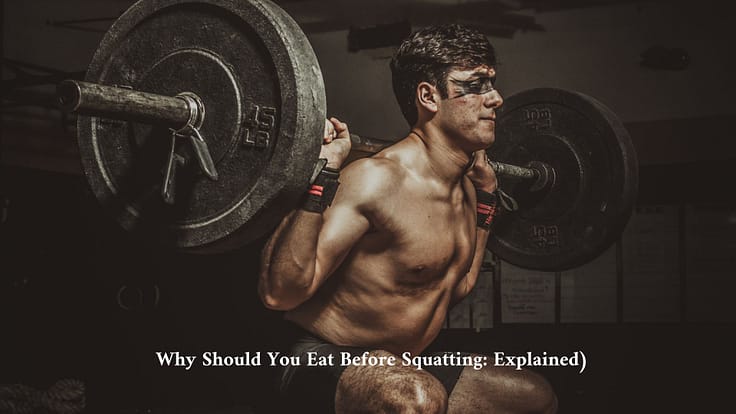Eating before exercise is a common practice among fitness enthusiasts, but is it necessary before squatting? Squatting is a compound exercise that targets multiple muscle groups, including the quads, glutes, and hamstrings.
It requires a significant amount of energy and strength, making proper nutrition and hydration essential for optimal performance.
However, there are also potential downsides to eating before squatting, such as digestive discomfort and reduced flexibility.
In this post, we will explore the resons why eating before squatting and help you determine whether it’s the right choice for you.
When you eat before you squat, your body converts the food into glucose, which is stored in your muscles as glycogen.
Glycogen is the primary source of energy that your muscles use during exercise, and when your glycogen stores are depleted, your performance can suffer.
By eating before you squat, you provide your muscles with a source of glucose that can be used to fuel your workout.
This can help you to lift heavier weights and complete more reps, as your body has the energy it needs to perform at its best.
when you squat, you are using a large number of muscles in your legs, back, and core.
These muscles require a lot of energy to work properly, and when you haven’t eaten before the workout, your body may not have enough energy to fuel all of these muscles. This can lead to fatigue and a decrease in performance.
eating before you squat provides your body with a source of energy that can help to improve your performance during the workout.
By having enough energy to fuel your muscles, you may be able to lift heavier weights and complete more reps, leading to better results and gains over time.
Better Recovery.
After a strenuous squatting workout, your muscles may feel sore and fatigued due to the micro-tears that occur during exercise. In order to recover and repair these muscles, your body needs nutrients like protein and carbohydrates.
When you eat before you squat, your body has a source of nutrients to draw from during the recovery process.
The protein in your meal helps to repair damaged muscle tissue, while the carbohydrates provide energy to fuel the recovery process.
In addition, eating before you squat can help to reduce the breakdown of muscle protein that occurs during exercise.
This breakdown, also known as muscle catabolism, can lead to muscle soreness and a longer recovery time. By providing your body with a source of nutrients before and during exercise, you can help to reduce muscle catabolism and speed up the recovery process.
Furthermore, eating before you squat can help to replenish glycogen stores in your muscles, which can be depleted during exercise.
This glycogen is used to fuel the recovery process and can help to reduce muscle soreness and fatigue.
eating before you squat can provide your body with the nutrients it needs to recover and repair after a workout.
By reducing muscle soreness and speeding up the recovery time, you can get back to your next workout sooner and continue making progress towards your fitness goals.

Increased Focus
When you haven’t eaten before your squatting workout, your body may not have enough glucose to fuel both your muscles and your brain.
This can lead to mental fatigue, which can make it harder to maintain focus and form during the workout.
By eating before you squat, you provide your body with a source of glucose that can be used to fuel both your muscles and your brain.
This can help to reduce mental fatigue and improve your ability to concentrate and stay focused during the workout.
In addition, when you’re hungry, your body releases hormones like ghrelin, which can make it harder to focus and concentrate.
By eating before your workout, you can reduce the levels of these hormones and improve your mental state.
Furthermore, maintaining focus and form during the squatting workout is crucial for preventing injury and getting the most out of the exercise.
By providing your body with the nutrients it needs before the workout, you can improve your ability to maintain good form and technique, which can lead to better results and fewer injuries.
eating before you squat can help to increase your focus and concentration during the workout.
By reducing mental fatigue and providing your body with the nutrients it needs, you can improve your ability to maintain proper form and technique, leading to better results and fewer injuries over time.
Reduced Risk of Hypoglycemia.
Hypoglycemia can cause a range of symptoms, including dizziness, weakness, fatigue, and even fainting.
This can be dangerous, especially if you’re lifting heavy weights during the squatting workout.
By eating before you squat, you provide your body with a source of glucose that can help to prevent hypoglycemia and keep your blood sugar levels stable during the workout.
This can reduce the risk of experiencing symptoms like dizziness and weakness, allowing you to perform the exercise safely and effectively.
When your blood sugar levels are stable, you’re able to maintain your energy levels throughout the workout. This can help to improve your performance and allow you to complete more reps and lift heavier weights.
Furthermore, when you prevent hypoglycemia by eating before you squat, you can also improve your recovery time after the workout.
Hypoglycemia can lead to increased muscle damage and soreness, which can prolong the recovery process. By keeping your blood sugar levels stable, you can reduce the risk of muscle damage and improve your recovery time.
Eating before you squat can help to prevent hypoglycemia and keep your blood sugar levels stable during the workout. By reducing the risk of experiencing symptoms like dizziness and weakness, you can perform the exercise safely and effectively, and by maintaining your energy levels, you can improve your performance and recovery time.
Here is a chart table with 20 pros and 10 cons of eating before squatting, along with the reasons why:
Pros of Eating Before Squatting |
Reasons Why |
|---|---|
| 1. Increased energy levels | Eating before squatting provides your body with a source of glucose that can be used to fuel the exercise, leading to increased energy levels. |
| 2. Improved performance | With increased energy levels, you are able to perform better during the squatting workout, lifting heavier weights and completing more reps. |
| 3. Reduced risk of injury | Eating before squatting can help you to maintain good form and technique, reducing the risk of injury during the exercise. |
| 4. Improved nutrient absorption | Eating before exercise can help your body to absorb nutrients better, improving overall health and well-being. |
| 5. Reduced muscle damage | By providing your body with nutrients before exercise, you can reduce the risk of muscle damage and soreness after the workout. |
| 6. Improved recovery time | Proper nutrition before exercise can help to improve recovery time after the workout, allowing you to get back to your routine faster. |
| 7. Reduced risk of hypoglycemia | Eating before exercise can help to prevent hypoglycemia and keep your blood sugar levels stable during the workout, reducing the risk of dizziness, weakness, and fainting. |
| 8. Increased focus and concentration | Eating before exercise can help to reduce mental fatigue, improving your ability to maintain focus and concentration during the workout. |
| 9. Improved glycogen storage | Consuming carbohydrates before exercise can help to increase glycogen stores in your muscles, which can be used to fuel the workout and support recovery afterwards. |
| 10. Increased protein synthesis | Consuming protein before exercise can help to support muscle growth and repair, leading to increased protein synthesis. |
| 11. Increased fat burning | Eating before exercise can help to stimulate fat burning, allowing you to burn more calories during the workout. |
| 12. Improved insulin sensitivity | Eating before exercise can help to improve insulin sensitivity, reducing the risk of insulin resistance and type 2 diabetes. |
| 13. Improved gut health | Eating before exercise can help to improve gut health, supporting the growth of healthy gut bacteria. |
| 14. Improved hydration | Eating foods that contain water, such as fruits and vegetables, before exercise can help to improve hydration levels in the body. |
| 15. Improved muscle endurance | With increased energy levels, you are able to maintain muscle endurance for a longer period of time during the workout. |
| 16. Improved muscle strength | Proper nutrition before exercise can help to improve muscle strength over time. |
| 17. Improved cardiovascular health | Eating before exercise can help to improve cardiovascular health, reducing the risk of heart disease and stroke. |
| 18. Improved bone health | Proper nutrition before exercise can help to improve bone health, reducing the risk of osteoporosis and fractures. |
| 19. Improved immune system function | Eating before exercise can help to improve immune system function, reducing the risk of illness and disease. |
| 20. Improved mental health | Proper nutrition before exercise can help to improve mental health, reducing the risk of depression and anxiety. |
Cons of Eating Before Squatting |
Reasons Why |
|---|---|
| 1. Digestive discomfort | Eating too close to the workout can cause digestive discomfort, such as bloating and cramping. |
| 2. Nausea and vomiting | Eating too much before the workout can lead to nausea and vomiting, especially when lifting heavy weights. |
| 3. Slower digestion | Digestion can slow down during exercise, leading to discomfort and reduced performance. |
| 4. Reduced fat burning | Eating too close to the workout can reduce fat burning during the exercise. |
| 5. Dietary restrictions | Some diets may restrict eating before exercise, such as intermittent fasting or ketogenic diets. |
| 6. Risk of acid reflux | Eating before exercise can increase the risk of acid reflux, especially if you have a history of it. |
| 7. Reduced flexibility | Eating too much before exercise can lead to reduced flexibility, making it harder to perform the squatting exercise properly. |
| 8. Risk of discomfort during exercise | Eating too much before exercise can lead to discomfort during the workout, making it harder to perform the exercise properly. |
| 9. Risk of decreased blood flow to muscles | Eating too much before exercise can lead to decreased blood flow to muscles, reducing nutrient delivery and impairing performance. |
| 10. Risk of overeating | Eating too much before exercise can lead to overeating, which can lead to weight gain and other health problems over time. |
Note:
That eating before squatting can have several benefits for your workout and overall health. However, it is important to note that the timing and content of your meal can also impact your performance. It is recommended to eat a balanced meal containing carbohydrates, protein, and healthy fats about 60-90 minutes before exercise.
Better Nutrient Absorption.
When you eat before you squat, your body has a source of nutrients to draw from during and after the workout.
This can help to improve nutrient absorption and utilization, especially when combined with the increased blood flow that occurs during exercise.
During exercise, blood flow to your muscles increases, which can help to deliver nutrients more efficiently to your cells.
This increased blood flow can also help to remove waste products from your muscles, further improving nutrient absorption and utilization.
By eating before you squat, you can ensure that your body has a source of nutrients to draw from during and after the workout.
This can help to improve your performance and recovery time, as well as support muscle growth and repair.
Eating before you squat can help to improve the balance of nutrients in your body. For example, consuming carbohydrates before exercise can help to increase glycogen stores in your muscles, which can be used to fuel the workout and support recovery afterwards.
Consuming protein before exercise can help to support muscle growth and repair, while consuming healthy fats can help to provide energy and support hormonal balance.
Overall, eating before you squat can help to improve nutrient absorption and utilization, supporting your performance, recovery, and overall health and well-being.
Conclusion
However, if you want to eat a small snack, 30 minutes before your workout would be a great time. It is important to keep in mind that performing a squat without food in your system may increase the rate of muscle breakdown.
Therefore, it is advisable to eat a small snack before squatting to ensure a steady supply of energy during the workout.

Hey there, it’s Mike Rrsq, the Editor-in-Chief over at Jsquat.com, and I’m absolutely obsessed with all things squat fitness! I’ve been lucky enough to get some serious recognition for my work in this field. With a solid background in the fitness and wellness industry, I’ve been there right from the get-go, helping shape this website into what it is today.
You see, I’m not just the boss around here; I’m also a passionate contributor. I love sharing my insights through my articles, and trust me, they’re not your run-of-the-mill stuff. Each piece I write is a labor of love, filled with my expertise and real-world experience in the fitness universe. So, if you’re into fitness and looking for some inspiration, you’re in the right place!


